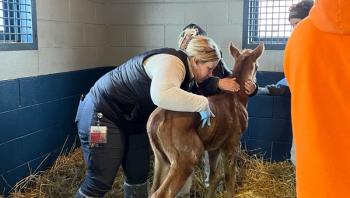
AAHA miffed by AVMA refusal to donate $75,000
Schaumburg, Ill.-A task force formed in 1996 to address vaccine-associated soft tissue sarcomas is nearing an end as leaders debate the group's relevancy. At the same time, the American Veterinary Medical Association (AVMA) is declining requests for $75,000 in financial support.
Schaumburg, Ill.-A task force formed in 1996 to address vaccine-associated soft tissue sarcomas is nearing an end as leaders debate the group's relevancy. At the same time, the American Veterinary Medical Association (AVMA) is declining requests for $75,000 in financial support.
To back Vaccine-Associated Feline Sarcoma Task Force (VAFSTF) researchendeavors, the American Animal Hospital Association's (AAHA) foundationpromised the group $15,000 a year for five years contingent on AVMA matchingthe award. When the AVMA refused, surprised AAHA leaders consequently pulledtheir own $75,000 pledge, lowering the contribution to $15,000 for one year.
"We truly thought the AVMA would support the task force becausecompared to their budget, the donation was a real small amount of money,"AAHA President Dr. Link Welborn says. "We're very disappointed. Itseems they have decided this is something they don't want to support."
AVMA and AAHA join the American Association of Feline Practitioners (AAFP)and Veterinary Cancer Society (VCS) as VAFSTF founders and members. AVMAhas never financed the task force aside from a $50,000 grant in 1997, however,the group does provide resources and staff support.
In AVMA's defense
The decision to reject AAHA's request for matching donations came downto the AVMA's status as a membership organization, says Dr. Bruce Little,the group's executive vice president. AVMA's budget can sustain a $75,000donation, he admits, but the association's mission does not include actingas a source for research dollars.
"AAHA feels like we've abandoned them, but backing research is notour job," Little says. "We're not going to commit membership duesto research. We have a foundation that determines what should be funded,and they're already supporting a vaccine study."
While not linked to VAFSTF, the foundation has backed a three-year, $25,000-a-yeargrant supporting Kansas State University professor Dr. Melinda Wilkersonto study vaccine reactions in dogs. The money came from a special bequestto the foundation dedicated for the research of diseases affecting companionanimals, says Paul Amundsen, the foundation's executive director.
"The task force did submit a request for funding," Amundsensays, "but the foundation has decided to get into more significant,larger research projects that have clinical applications."
Future hazy
It's unclear how the AVMA's money would have been invested by VAFSTF.Dr. Jim Richards, American Association of Feline Practitioners president-electand a VAFSTF founding member, says the task force is considering six researchproposals but adds its future is "uncertain at this point." Atpresstime, VAFSTF stakeholders were meeting by conference call to debatedisbandment.
"Right now, its existence is all contingent on gaining sufficientfinancial support," Richards says.
No matter the outcome, Richards is pleased with the task force's accomplishments.
VAFSTF surfaced when little was known about vaccine-associated malignanciesand brought the disease to the attention of veterinarians and pet owners.It was an unprecedented problem at the outset, Richards says, the most commonelective procedure in cats being directly associated with the developmentof aggressive cancers.
"I'm proud of the way the profession responded to this problem acrossassociation lines, which previously was unheard of," Richards says."I think we've been amazingly successful. If the noise has died down,I'd like to think it's partly due to the task force addressing the issueso aggressively. My belief is that the task force has a future, but I'monly one member."
Newsletter
From exam room tips to practice management insights, get trusted veterinary news delivered straight to your inbox—subscribe to dvm360.





